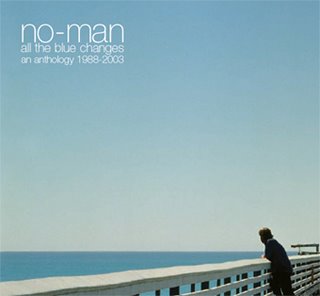No-Man ~ All The Blue Changes

A collection of hearfelt beauty
Simply put, this is an essential compilation by one of our great songwriting partnerships. Featuring the breathy vocals of Tim Bowness and the instrumental prowess of Porcupine Tree mainman Steven Wilson, the duo have been making achingly beautiful songs since the early 90’s. Originally a trio with violinist Ben Coleman their debut was a Donovan cover “Colours”. They followed this in 1991 with the absolutely gorgeous “Days In The Trees”. This is simply one of the best songs from the early 90’s without a doubt. This is included here together with its Steve Reich version, which is astonishingly set against a sample from Twin Peaks. Heartbreakingly good!
Those not familiar with the No-Man sonic palette would do well to forthwith. They have traversed everything from beat led dream pop to late nite ambient jazz. References to late period Talk Talk and David Sylvian have been made, but there is so much more to No-Man’s work than these influences might lead you. The key thing every piece of No-Man music has is a deep heartfelt belief in emotion and communicating that emotion. Bowness sings of lost love and you know he has experienced that loss and makes you feel it too!
There is so much to recommend here, each song has its own distinctiveness and is lovingly crafted. Particular favourites are “Pretty Genius” with exquisite contributions from Mel Collins, the dreamy piano of Nick Drake’s “Pink Moon” and the exceptional “Returning Jesus” with its odd squelchy synth opening reminding me of something from Robert Wyatt’s “Rock Bottom”.
This 2CD set is stuffed with key songs. But there is enough here for both the casual listener and the avid fan as some rare material is included. But this is only the tip of the iceberg. There is so much more that could have been included here. Like the adrenalin rush of “Kiss Me Stupid” or the ambient epic “Close Your Eyes” to name just a couple. But this collection will more than suffice and is nicely packaged in a fold-out digipack sleeve with a typically gorgeous design by Carl Glover.
Hopefully this collection will make you avidly search out more as you fall in love with these songs, as you will most certainly do.

